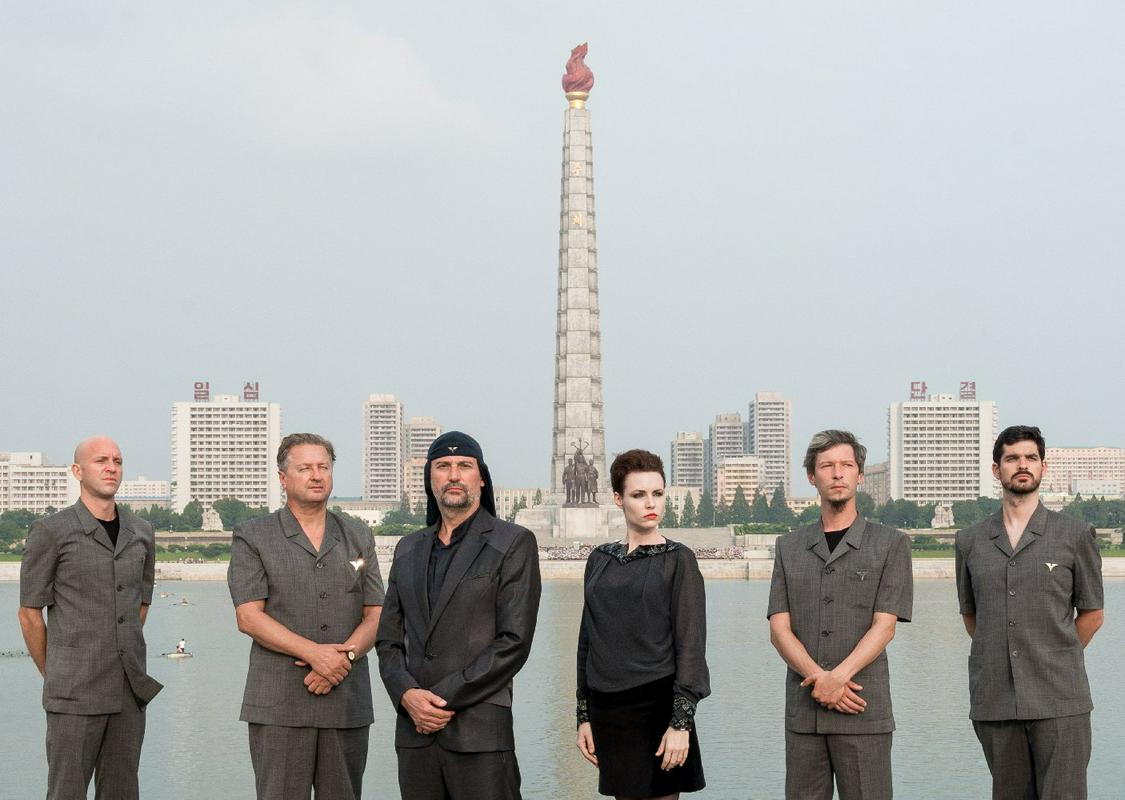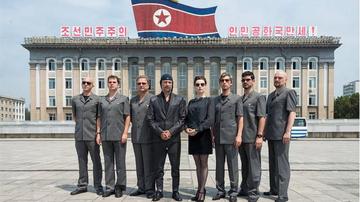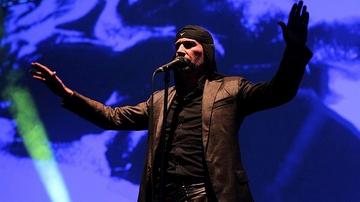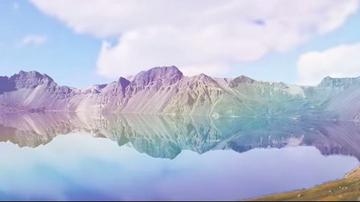

Under the loving but firm guidance of an old fan turned director and cultural diplomat, and to the surprise of the whole world, the ex-Yugoslavian cult band Laibach became the first rock group to perform in the isolated state of North Korea. Confronting the strict ideology and cultural differences that they find there, the band struggles to get their songs through the needle’s eye of the censor before they can be unleashed on an audience that had never been exposed to alternative rock’n’roll. Meanwhile, propaganda loudspeakers are being set up at the border between the two Koreas, and a countdown to war is announced. The hills are alive…with the sound of music.
The film starts with a clip of the comedian John Oliver, who talks enthusiastically about the first appearance by a Western rock group in the so-called hermit kingdom. "North Korea seems like a terrifying place to visit – but if it is really true that that guy [Milan Fras, the lead singer] is going to perform The Sound of Music, I kind of want to go there!", said Oliver on his HBO show, Last Week Tonight. The documentary continues with old Laibach recordings and videos, and an announcement of the band’s trip to North Korea. We then get to meet the members of the group and their Korean hosts.
Laibach’s trip to North Korea was organised by the Norwegian cultural activist Morten Traavik, who also wrote and co-directed the documentary Liberation Day about this historic event. The trip was full of challenges for Traavik, as well as for the group. As he puts it, "The Laibach concerts in North Korea had been one year in the making before we actually got there. Directing it all, largely from Europe while communicating with people in Pyongyang, keeping it all together, and eventually also the tremendous amount of media interaction that was needed, through all the interviews, trying to keep consistent and respond to all the different reporters. But even so, that week itself for me, I guess, was probably the point of my adult life where everything I’d learned up until then was put to the test."
For their two concerts in the country, Laibach made arrangements of songs from the musical The Sound of Music, which is very popular in North Korea, although each was performed in the band’s own style. When they returned from their trip, group member Jani Novak described it as "an exceptionally valuable experience, which confirms our old thesis that things are never what they look like, even if they look the same."
The film covers Laibach’s entire trip to North Korea, including some interesting adventures, preparations for the concert, meetings with censors, and so on, culminating in some clips from the concert. We learn that the audience was mostly made up of musicians and music students, along with some others. While admission to the concert was free, an invitation was needed, with the North Koreans also inviting all of the foreign ambassadors to Pyongyang to the event. "The idea of the film was to show how it was and what we all went through. We wanted to tell the story from our perspective", said Novak after the Ljubljana premiere.
The historic concert was also attended by 30 fans of Laibach from all over the world. These included Laibach’s producer at Mute Records, who said after the concert that "it's probably one of the most significant, if not the most significant, concert I've seen since I started."
According to the filmmakers and performers, two of the songs were censored. Morten Traavik, who co-directed the film with Latvian director Ugis Olte, said he is not sure whether the film will be shown in North Korea. "I think that Laibach is the only band that could pull off something like this [communicating with the North Korean regime]. Who else could combine rock’n’roll with a musical style that suits North Korea? This is of course the main reason I chose this group. The people there have never seen anything like this, but at the same time the group’s image, their history, iconography and of course their music, include elements that are familiar to them. […] The best part of all is that Laibach is a surprising, but also a pretty logical, choice for the first Western band to play in North Korea. That’s also a paradox, and I am very proud to have brought this event into a system which is not exactly thrilled about paradoxes," adds Traavik.
The documentary was also accompanied by a talk by the Slovenian philosopher Slavoj Žižek, who said, "I think that Laibach in North Korea is the most fascinating cultural, ideological and political event so far in the 21st century."
Polona Prešeren, Sinfo
Under the loving but firm guidance of an old fan turned director and cultural diplomat, and to the surprise of the whole world, the ex-Yugoslavian cult band Laibach became the first rock group to perform in the isolated state of North Korea. Confronting the strict ideology and cultural differences that they find there, the band struggles to get their songs through the needle’s eye of the censor before they can be unleashed on an audience that had never been exposed to alternative rock’n’roll. Meanwhile, propaganda loudspeakers are being set up at the border between the two Koreas, and a countdown to war is announced. The hills are alive…with the sound of music.

































































